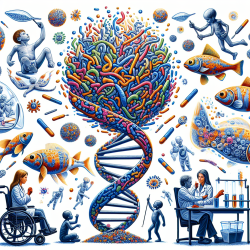Unveiling the Mysteries of ACBD6 Variants: A Leap Forward in Understanding Neurodevelopmental Disorders
Recent research has uncovered a significant link between bi-allelic ACBD6 variants and a distinct neurodevelopmental syndrome characterized by progressive and complex movement disorders. This groundbreaking study, published in Brain, highlights the importance of ACBD6 in neurological development and offers new avenues for therapeutic interventions.
The Research Breakthrough
ACBD6, a member of the acyl-CoA-binding domain-containing proteins, plays a crucial role in lipid and protein acylation. The study identified 45 individuals from 28 families with bi-allelic pathogenic variants in ACBD6, leading to a complex disease involving developmental delays, movement disorders, and other neurological impairments.
Using advanced genetic techniques, including exome sequencing and international data sharing, researchers pinpointed loss-of-function variants in ACBD6. The study also utilized zebrafish and Xenopus tropicalis models to replicate the human phenotypes, providing valuable insights into the disease mechanisms.
Clinical Implications and Practitioner Insights
The findings of this study have profound implications for practitioners working with neurodevelopmental disorders. By understanding the genetic underpinnings of ACBD6-related syndromes, practitioners can better diagnose and manage these complex conditions.
- Early Diagnosis: Recognizing the symptoms associated with ACBD6 variants can lead to earlier diagnosis and intervention, potentially improving patient outcomes.
- Personalized Treatment Plans: Understanding the genetic basis of these disorders allows for more personalized treatment approaches, tailored to the specific needs of each patient.
- Research Opportunities: This study opens the door for further research into ACBD6 and its role in neurological development, encouraging practitioners to explore new therapeutic strategies.
Encouraging Further Research
The study's findings underscore the importance of continued research into the genetic factors influencing neurodevelopmental disorders. Practitioners are encouraged to stay informed about the latest developments in genetic research and consider participating in studies that explore the role of ACBD6 and similar proteins.
By collaborating with researchers and contributing to data collection efforts, practitioners can play a vital role in advancing our understanding of these complex disorders and improving patient care.
To read the original research paper, please follow this link: Bi-allelic ACBD6 variants lead to a neurodevelopmental syndrome with progressive and complex movement disorders.










